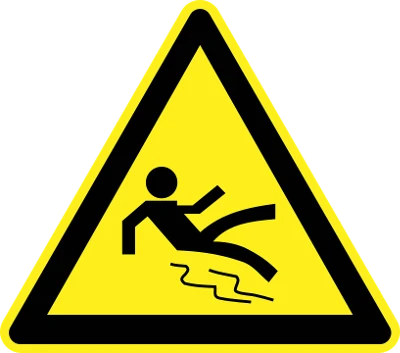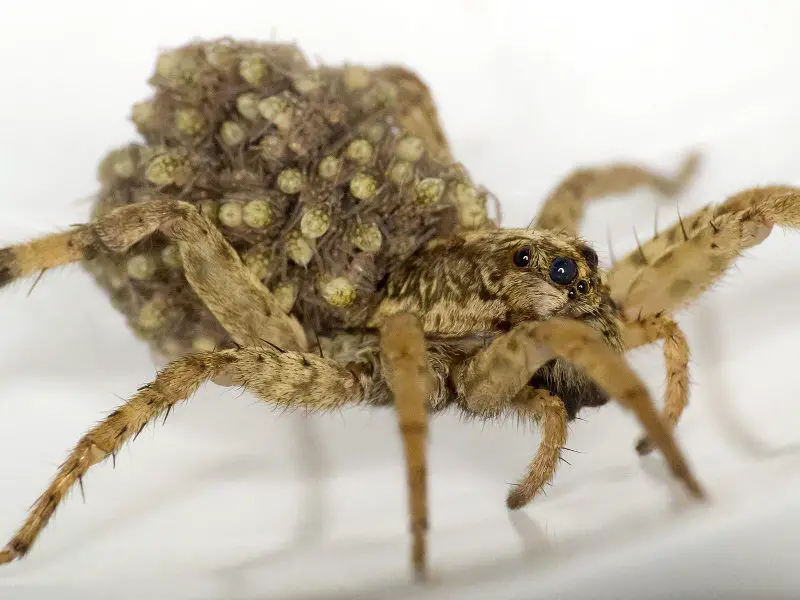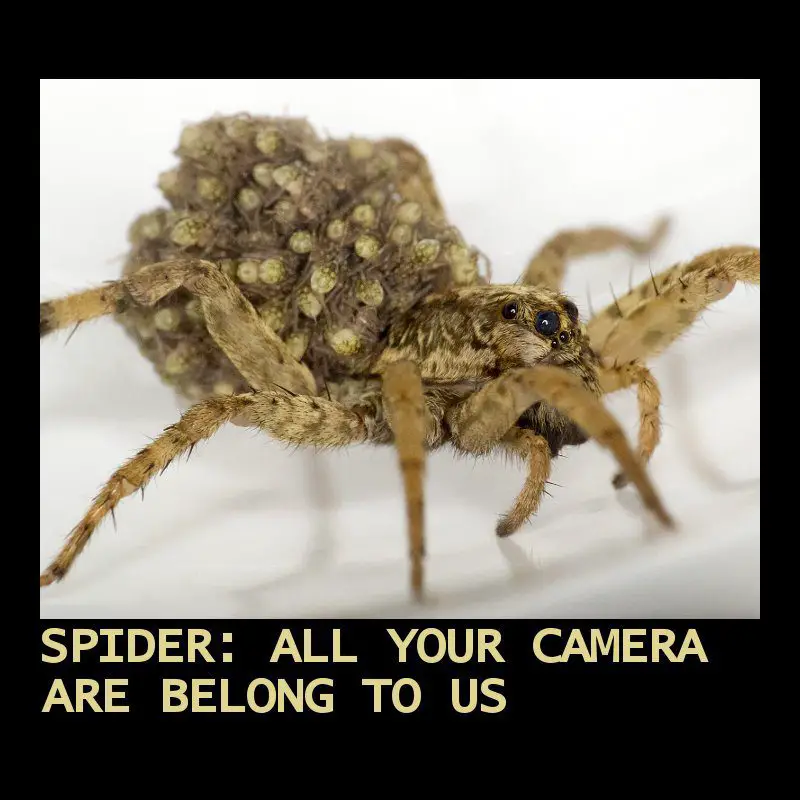Have you ever put hours into mounting your security cameras just to wake up in the morning and review hours of spider video triggered by motion alerts?
If you can relate to this post on Imgur, then we can help. We've compiled the best ways to keeping spiders off security cameras in one place for you to try.
In this post, we’ll cover the following:
Why Do Spiders Love Security Cameras So Much?
Why Not Just Use Pesticides on Your Spiders?
The Best Ways to Keep Spiders Away From Cameras
Why do spiders love security cameras so much?
To fix the problem, it helps to understand the root cause.
First, spiders don't love cameras.
They love bugs!
And bugs love your cameras. If you're lost, just give me a little rope here.
Many nocturnal bugs like moths use the light of the moon and stars to navigate and are also attracted to infrared light. Yes, the same infrared light that your cameras use to illuminate things outside at night.
So, as long as the infrared LEDs are enabled on your camera, you are going to have problems with attracting bugs, and therefore, the spiders that eat them.
Couple that with most cameras being sheltered under eaves from rain with handy places to attach a web, and you've got a dandy place for a spider to set up shop.
Why not just use pesticides on your spiders?
Well, for one, some people have pets and small children around and don't want to take the risk of poisoning a loved one.
Aside from that and compounding our problem, spiders are notoriously tough to poison.
It turns out that spiders can tiptoe through pesticide barriers, getting very little exposure to the chemicals. Then, they don't groom themselves to ingest poisons on their legs. So, they rarely die from the exposure.
The Best Ways to Keep Spiders Away From Cameras
Alright, enough about the whys, let's get into the hows. As in, how to get rid of them.
Just be forewarned:
Most of these techniques are going to be temporary, and you may have to reapply as needed. We'll share to you some clever ways on how to stop spiders making webs on cctv.
I've divided them up so that if you choose, you can escalate your level of response and avoid some pretty nasty and persistent chemicals. Or, just go nuclear winter from the start, your call.
Full Nuclear
For those that don't want to play around, you can start with the heavy stuff first.
Pro Strength Pesticides
The first recommendation is often used by farmers around livestock barns. Take a clue that its recommended use is far away from people. Country Vet CV-80D is designed to be potent and long duration.

 Image takes you to Amazon, and donates a nickel
Image takes you to Amazon, and donates a nickelMore Chemicals
Bifen (or Befenthrin) is often used against fire ants and is restricted to low concentrations. It also has the longest residual time in soil of insecticides on the market, so it's nasty stuff that can hang around a while.
Ortho Home Defense Max pairs this with other chemicals to help it persist longer where it is applied, but it is also available as Transport, Brigade, Torant, and Zipak. All of them should give you decent persistence for a camera under your eaves. Exposed to the rain, good luck.
Literally Nuclear

Import nuclear cooling water from the Fukushima nuclear plant. I read they are pumping it out and storing it into huge tanks and stacking them all over the plant. I'm sure they could use the extra space.
OK, had to throw at least one in to keep you awake!
Tactical Deterrent
For those that don't want to go all out on the first salvo, there are some other options available that aren't as persistent or poisonous.
Bahama Breeze
You can also try using a fan to deter spiders. It will make it tough for them to build webs and also keep flying insects from coming too close.
No food = no spiders
What you may be able to do is to get a cheap computer fan and connect it to your camera's power connector. Obviously, you'll have to check for compatible voltages, but the low current draw should not cause you trouble drawing too much power.
Flea and Spider Collars?
If they work on fleas, why not spiders, right?
Why not try looping a flea and tick collar around your camera. I've seen in some forums where people had good luck with them.
Spontaneous Breakdancing May Occur

Many, many sources recommend some type of lubricant to deter spiders. You can use silicon or Teflon spray to cover the body of the camera.
Just be sure to keep it off of your lens. You can use a paper towel to cover it while you spray it. Or, use a brush or rag to rub it on the camera.
Another recommendation that will hang around for longer and is cheap is Vaseline.
Moth Balls
As anyone who has run rodents out of a house knows, moth balls can be very effective deterrents for animals. Simply toss a few in an old pair of panty hose or spare screen material and use a zip tie or rubber band to attach them to your camera.
They should buy you a few months if they're out of the rain.
For the Monks Among Us
Don't want to hurt the cute, little spiders?
You may not be totally out of luck, even if you are out of your mind.
If you want them to stick around and catch mosquitoes but not perform for your camera, these ideas may be just right for you.
Static Free = Spider Free?
Attach a drier sheet around the cameras. The strong smell will keep spiders away from cameras as long as it lasts. One helpful tip is to use a rubber band to hold it on and then you know you need to change it when the rubber band breaks.
Vinegar, Cleaning and Bug Deterrent Wonder Liquid
Popular as a cheap, non-toxic cleaner, vinegar can also be good at deterring bugs. But, this one will depend on which insects your particular spider is feasting on.
Supposedly, vinegar can smell like rotting fruit and attract some types of flies.
In other words, YMMV!
Surrender! Wait a minute . . .
Since the IR LEDs are attracting the bugs, why not just disable them? If you buy a low lux camera, then you may not miss the extra light from the IR LEDs.
If you don't know what "low lux" is, check out our camera buying guide.
Decoy
Why not just relocate your problem?
If your camera allows it, you can disable to IR LEDs on the camera and mount an external illuminator several feet away. If you buy a quality unit (here's a well rated one), you'll get better performance (illumination distance) AND avoid the spider problems.
Natural Remedies
One natural remedy that I've seen is a solution of white vinegar, horse chestnut oil and peppermint. Mix it together and use a bottle to spray it around the area.
Be sure to avoid the actual camera because the oils and plastic may not play nicely together, brush a thin layer of solution around the outside of the camera and surrounding area. Spiders hate it and will stay well away. I successfully got rid of my epidemic using these things.
Fight Them with . . . Lemons
Citrus oil is also a good fix for a few months. Again, it may react with plastic so be careful where you put it or test it in an inconspicuous area first. If you're putting it on brick siding, it may be the best natural solution for you.
Assisted Relocation
Another out of the box idea is to make a new home for your spider. Gardeners use spider houses to control where spiders built and still control pests. So, there's no reason you couldn't give your spider an attractive home nearby.
The house can be any round(ish) structure about 12" across with a small roof to protect the web from rain. Once you get an alpha spider living on your "house," he'll do the work of keeping the other spiders away.
Just be sure it's out of the elements and there's plenty of bugs around to eat and your spider may be content to stay out of the limelight.
Swarm Attack . . . er, Defense!

Finally, if nothing else you try works, just increase the camera to spider ratio. That way, not matter what night it is, you'll always have at least one unobstructed view of any perps sneaking through your yard.
Though after seeing this picture, you may decide that you've underestimated their ability to cover all of your locations.
I'm ready to go full nuclear on spiders

Hi, I’m Jody. I graduated with honors with a Masters of Science in Computer Engineering and have over 15 years of experience working as an engineer with electronics products. I’m a lifelong learner and tinkerer and enjoy automating things around the house so I can solve bigger problems than getting out of bed to check if the garage door is closed . . . like too little sleep!


Lol, great post! Thank you for the tips, but more importantly, the laughs!
Glad you liked it! One has to maintain a sense of humor when dealing with these things ;)
Hmm. We will adopt some of the idea’s and let you know in due course.
Annie.
Sounds good, hope it goes well
You’re spot on about the pesticide sprays, I bought two, that I know kills roaches ants and most bugs, but spiders? they seem to thrive on it, really, so I am now using mothballs, (very hard to get now) I will let you know how that fares out. thanks for tips and laughs…
I have heard of people using panty hose or cheese cloth to hang moth balls. I’d be interested to hear how you keep them close to your cameras and how it works out.
I tried panty hose once, I had to put it over my head to stretch it out and the neighbor thought I was a robber and called the police. Needless to say that was the worst night of my life and after about four hours being booked and processed I was released.
I have an 8 camera system that had the same problem but I’ve found some other remedies that work: 1. halitosis – if you know anyone with a really bad breath, just have them come and breathe a thin layer of frost onto the lens. 2. Replace the camera with a warning sign stating “smile your being recorded”. Criminals will see the sign whilst being bewildered as to its whereabouts. 3. Try talking to it and politely asking it to leave. There was once a spider name Charlotte and… well you know how the story goes. 4. Get a Spider-Man costume, earn the spiders trust, exhibit dominance, become the Alpha, and command the spider to leave…or create an army.
Hope this Helps!
All solid ideas, thanks for adding to the list!
I have tried some of them remedies but they keep coming back after a week or two have not tried Vaseline that sounds like a good one
I’m keen to know how it works for you.
Haha, thoroughly enjoyed your very humorous take on this rather sticky problem! I have been battling these monsters for a few years now and what’s worked best for me is your decoy solution. Everything else seems to last only a few weeks at most.
Glad you liked it!
I have 5 outside IR cameras and all but one has terrible spider problems. The one with no problems is mounted in the top of the gable end peak protected by the overhang and right in front of the gable vent. You can feel warm air coming out of this vent but not fan-like, just some natural thermal convection heat movement. I have tried insect sprays and moth balls on the other cameras with poor results. Going outside now to try some dryer sheets with rubber bands, will report back after a few days. Thanks for the tips.
Great, I look forward to hearing how it went.
Did the dryer sheets work?
You miss the one simple one. For some reason spiders don’t like the smell of walnut. Mount your cameras on a backboard of walnut and this keeps spiders away. It’s a trick I got from a friend who lived in France. They were converting an attic in an old French house and they asked me what was missing in a place that had been empty for 20 years. I looked around and yes not a spiders web in site. All the roof beams were in walnut and spiders don’t like it.
I’ve never heard of that, thanks for the tip. Sounds like I have an experiment to run!
I tried some of these solutions but never thought of lemon. I will give it a try.
Great, let us know how you fair.
I have the IR’s mounted well away from the cameras but it seems the spiders are actually working for and with the devil and you cannot fool them so easy.
Ha, that’s a bummer! I guess for some spiders a nice sheltered overhang is just too tempting. Maybe the alpha male spider gets the IR illuminator and the beta gets the camera.
I’ve tried moth balls – didn’t faze the spiders around Wichita Falls Texas Walnut – interesting. Going to try that. Seems that would last longer than most other suggestions.
Thanks for passing on your experience with the mothballs, Ardy. Looking forward to hearing how the walnut works.
Did the walnut work? Just mounted some cameras. Maybe I’ll put some around them
Happy New Year! Anyone else have success with walnut board? If so, where do you buy it?
Smitty
I am currently using the most guaranteed way to eliminate these pesky little guys.
My method is fail proof. I have a telescoping pole with a “Y” shaped end. I wrap it in tape with the sticky side out. I wait until they are active at night, (very inconvenient), and use a spot light. When I see them resting or moving, I squash them! : )
I have had some success with this method but there is no relief. It is ongoing. That is the down side.
I like the idea of the walnut wood as a repellant. Is there any particular walnut wood?
I presume you mean black walnut? I will try attaching a small strip on top of the camera with double sided tape . Hope it works. These guys are killing me.
I like the success rate, but not the level of automation. ;)
I haven’t heard any specifics on the type, and unfortunately no one has reported back how successful it was for them. The most reliably solution will like be a relocated illumination source unfortunately.
Or just splat it! Pesticide is a slow and painful death ?
Dome housings do not have crevasses that spiders like for web building.
I agree, there’s less opportunity. But, I’ve still had problems with spiders on dome cameras unfortunately. Maybe your installed location is also a factor…?
I have some walnut trees in my garden, I am going to try some green leaves from the tree as they are very pungent
Perfect, be sure to let us know how it goes!
All my IR Cameras are exposed to the weather what would be the best way to zap the critters. I live in Ireland ?? so we get quite a bit of the wet stuff. Love the page by the way.
I’m afraid I don’t have a secret weapon for you George. The most reliable method that I’ve found is using a persistent pesticide, and you’ll likely have mixed results given how much rain you get and depending on how sheltered your cameras are from direct precipitation.
A separate IR illuminator is going to be your most reliable fix, I’m afraid.
We’ve had as many as 704 alerts in a single evening because of a single spider on our camera. We’re going with the simple solutions first. We’re eliminating the mothball solution (long horrible story about moth balls and snakes). We’re going to try the flea collar first. Seems the least messy method/costly method to try. That’s about all the chemicals we’ll try. Our next attempt should the dog collar not work is walnut oil. We’ll soak a cloth and rubber band it to the back of the camera. If that doesn’t work we’ll try walnut wood. I think that if the walnut wood works, it would need to be roughed up periodically to allow for the oils/sent to be strongest. Its the same thing that you have to do to a cedar chest or closet. Anyway. I hope others report back on the success/failure of their attempts.
Hi Cheryl,
I was wondering whether you have had any luck with the flea collar and/or walnut oil. Did it work, or have you found a better solution maybe?
I just have two cameras, both easy to reach. I hit them with canned air when the webs start showing up. That’s good for a week or so.
I might try a flea collar or some of the other ideas that have been mentioned here.
Dome cameras. Spiders need space for their webs, and domes don’t have any.
They still get on domes also Larry. The little beasts cover anything. I’ve got domed ones at work on tall buildings and the monsters still cover the camera housings in no time. I have several cameras at home and they are giving me a hassle as well. I’m going to try the dog collars I think on the ones at home.
Great article and discussion, but strange I see no mention of the commercial products marketed for this problem.
Google “stop spider webs”
For instance, Web-Out claims to “break[s] down webs to make cleaning easier while preventing spider webs on surfaces.” Most have a residual component that keeps the webs from adhering.
My wife hates spiders and would spray something like this all around the porch ceiling of the house in the woods we had in SC. It was good for a year (not in rain).
You would have to keep it off the lens and out of any cracks or other openings. I’d recommend confirming that the product was safe for plastics if your camera body was plastic. The stuff my wife used (and Web-Out) are safe on painted surfaces, which to me means it shouldn’t hurt anything sold for outdoor use.
Well, this settles it. I’m about to sell some property that has acres of walnut trees on it. I’m going to cut one down, make some boards out of it, and mount my cameras on them. These are Black Walnut trees in Indiana. I’d go with the Fukushima option but toxic waste didn’t work out so well for some people in the movie “Eight Legged Freaks” – a highly intellectual movie about mutant spiders – or maybe just fun to watch. The soundtrack music is particularly fun.
I also have some Permethrin from Rural King which I’ll try if the Walnut doesn’t work. I enjoyed this post. I’ll bookmark this site. Thanks much.
It sounds like coming across this write-up was a fortuitous turn of events for you! It’s too bad you can’t varnish one of those slices of walnut, it sounds like they would look great.
I should also mention that while there is much debate whether this works or not, I put hedge apples (inedible Osage-Orange tree fruit) in my sheds out in the woods. While it does nothing for mice, there seem to be no spiders in those sheds. When I forget to put them out in a little bowl in a corner, I get spiders. When I remember, no spiders. Regardless of the science I’m a believer. However, they do need to be in an enclosed area. However, perhaps their juice painted on a camera housing in that weather-protected gap might work. My cameras have small gap between the camera body and a cover for rain. I may try that on some cameras and a walnut mount on others and just Permethrin on others. They all get spiders at this point though we’re headed into Fall and temperatures will drop in a few weeks. Some of the cameras are hard to reach without a long extension ladder so I hope one of these ideas works. Thanks again for your website. Now, if I can just find a way to keep the mice from eating my sparkplug wires’ insulation which was made from soybeans because of some unenlightened engineer, life would be good in the woods. Thanks again.
Thanks for the tip on the Osage, Don. I’d love to hear back about your split test with the Osage-Orange vs. Permethrin. Sounds like you need to hang a stocking of moth balls in the engine bay!